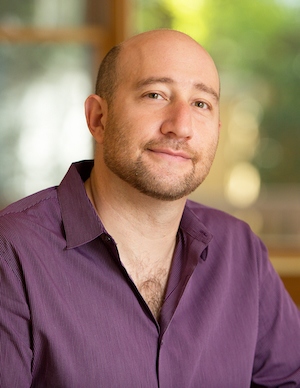Aaron Hamburger | Guest Writer for MFA Program

Hood’s creative writing MFA program welcomes Aaron Hamburger as a guest writer for June 2025 residency.
Q&A
Department
- English & Communication Arts
Aaron Hamburger is the author of a story collection, The View from Stalin’s Head, which was awarded the Rome Prize by the American Academy of Arts and Letters and nominated for a Violet Quill Award. He has also written three novels: Faith for Beginners, nominated for a Lambda Literary Award, Nirvana Is Here, winner of a Bronze Medal from the 2019 Foreword Reviews Indies Book Awards, and Hotel Cuba, which was featured by NPR, named a Best Book of 2023 by Hadassah Magazine and won the 2024 Bridge Book Award for American Fiction. He has taught creative writing at Columbia University, the George Washington University, New York University, Brooklyn College, and the Stonecoast MFA Program. In the conversation below, he discusses his new novel, the research process behind it, and how he hopes to help writers at Hood find their voices.
When did you first become interested in writing and what sparked your passion?
My passion for writing grew out of my passion for reading. I don’t know of any great writer who was not also a great reader. The art of storytelling is like a rich conversation between your voice and the voices of others. I was the type of kid who always went around with a book (or two or three) in hand, so I knew when I grew up I wanted to write a few myself. A few of the writers from the past who’ve inspired me along the way include Jane Austen, Charles Dickens, D. H. Lawrence, E. M. Forster, Virginia Woolf, Ernest Hemingway, Bernard Malamud, Philip Roth, Anne Tyler, Lorrie Moore, and Toni Morrison as well as too many others I’m forgetting!
Your latest novel, Hotel Cuba, is inspired by your grandmother, who immigrated to the U.S. from Eastern Europe via Cuba. In what ways did you try to subvert and/or embrace the traditional immigration narrative?
With Hotel Cuba, I wanted to make a story set in the past feel vital, alive, and real, as it must have felt to those who lived it. One way to do that was to steep the work in details that appealed to the five senses. I also deliberately narrated the book in the present tense to suggest to readers that the outcome of the story is up for grabs. Happy endings are not guaranteed. Finally, as I was researching the story, I was surprised by how many details resonated with contemporary life, including LGBT characters and debates about immigration—still going on today! So I made sure to include them.
What was the research process like while writing Hotel Cuba?
I did an immense amount of research including travel, visiting archives, reading primary and secondary sources, interviewing folks, listening to recorded interviews with my grandparents about their stories of immigration, watching movies, listening to music, and looking at advertising from the time, which was incredibly revealing. It taught me what people had, what they didn’t have and dreamed of having, and how they were being marketed to.
You’ve taught at various creative writing programs around the country. What do you see as the benefits of the low-residency model?
There are so many benefits to the low-res model, beginning with the fact that you don’t have to uproot your life and move somewhere. You can do it right where you live! Also, the amount of personal attention you get working one-on-one with a mentor at a low-res program is impressive, and the bonds you make with your classmates are also quite strong because the time you spend together is so intense.
We’re thrilled to be hosting you at Hood College this year! What are your plans and hopes for your time as a guest writer at the MFA program at Hood?
Primarily, I’m hoping to get to know the students and my fellow faculty. I teach because I love to learn, and I always learn from the people I meet at programs like Hood. Of course, I also hope to share what I’ve learned, sometimes from wise mentors I’ve had, sometimes from hard experience. I hope others can benefit from the lessons I’ve learned as a result of numerous mistakes I’ve made. Finally, I once heard it said that great teachers always ask questions that they themselves don’t know the answers to. It’s important as a teacher of writing not to dictate, but to point out the eternal questions that all writers face, and that each individual writer answers in their way, which is what creates their unique voice.
How can students utilize an MFA within their career path? What do you see as the value of studying the arts in a climate where the humanities are frequently under attack?
No matter your ultimate career path, an MFA trains your brain to think critically. It also hones communication skills, which are more vital than ever in a work world where technology is evolving with alarming rapidity. It’s become clear to me that valuable employees are ones who know how to think and how to learn because we’re required to be flexible and adapt as the world changes around us. Plus, people who love books and stories and good writing are just so much cooler to hang around with. Who could resist hiring one? In terms of the arts and humanities being under attack—when were they NOT under attack? And for good reason. Artists remind us to challenge preconceived notions and received wisdom. No wonder there are vested interests who want to suppress their voices. That’s exactly why we need them: to help keep us sane in an insane world.
Learn more about Hood’s low-residency creative writing MFA program.
Are you ready to say Hello?
Choose a Pathway
Information will vary based on program level. Select a path to find the information you're looking for!
